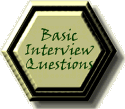Interview Tips

Interview Tips
Body language will often give you clues you can use in an interview. Mirror the interviewer where possible. One job seeker I know spent half of an interview sitting back in his seat trying to look relaxed, while the interviewer sat forward, arms on the desk. At the end of the interview, the applicant was told that it wasn't until he sat forward in the chair and leaned closer to the interviewer (unconsciously mirroring the interviewer's pose), that the interviewer felt he was enthusiastic about his subject. He almost lost the job because he didn't consider body language.
The hardest questions will probably come at the front and middle of the interview. Personal questions will usually come in the second half of the interview (after your skills and experience have been qualified).
If the interview is off track, use your answers to help bring it back to the point.
No one is going to be perfect in an interview. It's how you react to your faux pas that counts in the interviewer's eyes. not whether you made them.
When you are asked, "Tell me about yourself", this is a great opportunity to sell yourself using your 30-Second Message.
Rather than answering a salary question during an initial interview, try to postpone the question, find out what the position range is, or give a range rather than an exact number. See the salaries and negotiation page for more information on this one. Answering a question with a question is a great way to uncover additional information about expectations and requirements.
Remember:
"No one is going to hire you for what you were, but for what you ARE".
Ask questions during an interview. Not asking questions is often interpreted as a lack of interest in the job. Make these questions pertinent to the job position and company.
Your ending question should always be, "what is the next step?" or "where do we go from here?" or something similar.
Ask to meet fellow co-workers or team members.
Request a tour of the facilities, if appropriate.
Write up your notes for the interview right after the interview.
Follow-up with a thank-you note or e-mail within 24 hours. Re-iterate something positive which you took away from the interview with you. Be sure that you use the correct spelling of the interviewer's name. One way to be sure you have the correct spelling is to ask for a business card at the end of your interview. Send a thank-you note to EACH interviewer.
Interview Summary
|
|
Pay attention to body language, yours and the interviewer's. |
|
|
Maintain relevance in your answers. The answers should answer the question asked and be relevant to the position for which you are applying. |
|
|
It's how you recover from mistakes, not whether you make them, that counts in an interview. |
|
|
Sell yourself! |
|
|
Answer questions with questions to uncover important information. |
|
|
Ask questions. Ask to meet fellow co-workers. |
|
|
Write up your notes afterward. |
|
|
Send a thank-you note within 24 hours. |
|
|
Follow-up! |
Things Which May Count Against You in An Interview
Being late: Indicates this interview is not a priority for you.
Ringing of cell phone, beeping of pager or watch: Indicates lack of courtesy to interviewer, not willing to give interview your full attention.
Watching the clock or looking at your watch: Is the interviewer BORING you?
Shuffling through papers: Lack of organization or planning.
Rambling or apologizing for imperfections or nervousness: Lack of confidence.
Arguing with interviewer or interrupting the interviewer: Argumentative and troublesome, a problem child.
Making assumptions: Poor judgment, could be problem employee, may have trouble working with others.
Talking about money in the first interview: Desperate? Or greedy?
Mentioning other offers: Trying to pressure the interviewer? We'll see about that!
Wearing perfumes or scents or smoking beforehand: The interviewer may be allergic.
Chewing gum during the interview: Distracting.
Being discourteous to someone: Many interviewers will ask the receptionist for their impressions of you.
Phone Interviews
Replace the jolly social message on your answering machine with a more professional message. (i.e. "You have reached (555)555-5555, no one is available at the moment, please leave a message and we (I) will return your call").
Find a quiet place to talk. Small children, barking dogs, seagulls and cafe noises in the background are all distracting.
Be prepared! Have all pertinent papers to hand, and all of your questions and notes ready.
Remember your attitude will come across on the phone, whether enthusiastic and confident, or nervous, bitter or discouraged.
Write a thank-you note just as you would for a face-to-face meeting.









